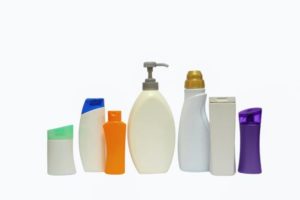 Once again research finds that endocrine disruptors are associated with health effects - this time with earlier puberty in girls. Endocrine disruptors are chemicals that interfere with the body's endocrine (or hormone) systems and can produce all sorts of negative health effects, including all sorts of reproductive problems in both males and females. Phthalates, parabens, and phenols (all used in common everyday products) are examples of endocrine disruptors.
Once again research finds that endocrine disruptors are associated with health effects - this time with earlier puberty in girls. Endocrine disruptors are chemicals that interfere with the body's endocrine (or hormone) systems and can produce all sorts of negative health effects, including all sorts of reproductive problems in both males and females. Phthalates, parabens, and phenols (all used in common everyday products) are examples of endocrine disruptors.
The researchers asked the question: Is a baby's exposure before birth or exposure around the time of puberty (peripuberty) to phthalates, parabens, and phenols (which are found in personal care products) associated with the timing of when he or she starts puberty? In other words, does the mother's exposure to these chemicals during pregnancy have an effect on the fetus, which then has an effect years later on the child's puberty? And how about peripubertal exposure? The answer is a strong YES for girls, and minimal effect on boys (but boys did have earlier genital development with propyl paraben exposure).
What is scary is that almost all women (and men) are exposed to these chemicals - which can be measured in the urine. Studies find these chemicals in over 96% of American women. What to do? One can't totally escape these chemicals, but one can really minimize exposure by reading labels and avoiding personal care products that list phthalates, parabens, phenols, as well as Triclosan (found in some anti-bacterial soaps). Avoid products that include "fragrances" or "scents" (those have a multitude of chemicals in them, including endocrine disruptors). Avoid air fresheners, dryer sheets, scented candles, room deodorizers, essential oils (lavender, tea tree oil). Buy "unscented" or "fragrance free" products.
The good news is that once a person avoids these chemicals, the levels in the body go down. So it's worth the effort minimizing exposure to them. By the way, animal studies find numerous reproductive effects from these chemicals, including timing of puberty. From Medical Xpress:
Chemicals in personal care and household products linked to earlier puberty in girls
Chemicals that are widely used in personal care and household products are linked to girls entering puberty at earlier ages, according to findings from a long-running study of mothers and children published today. The study in Human Reproduction, one of the world's leading reproductive medicine journals, found that chemicals such as phthalates, parabens and phenols were all associated with earlier puberty in girls, although there was no similar association observed in boys.

 Ten chemicals suspected or known to harm human health are present in more than 90% of U.S. household dust samples, according to a new study. The research adds to a growing body of evidence showing the dangers posed by exposure to chemicals we are exposed to on a daily basis. The chemicals come from a variety of household goods, including toys, cosmetics, personal care products, furniture, electronics, nonstick cookware, food packaging, floor coverings, some clothing (e.g., stain resistant), building materials, and cleaning products. How do the chemicals get into the dust? The chemicals can leach, migrate, abrade, or off-gas from the products, which winds up in the dust and results in human exposure. (That's right: vacuum a lot and wash your hands a lot, and try to avoid or cut back use of products with these chemicals,)
Ten chemicals suspected or known to harm human health are present in more than 90% of U.S. household dust samples, according to a new study. The research adds to a growing body of evidence showing the dangers posed by exposure to chemicals we are exposed to on a daily basis. The chemicals come from a variety of household goods, including toys, cosmetics, personal care products, furniture, electronics, nonstick cookware, food packaging, floor coverings, some clothing (e.g., stain resistant), building materials, and cleaning products. How do the chemicals get into the dust? The chemicals can leach, migrate, abrade, or off-gas from the products, which winds up in the dust and results in human exposure. (That's right: vacuum a lot and wash your hands a lot, and try to avoid or cut back use of products with these chemicals,)